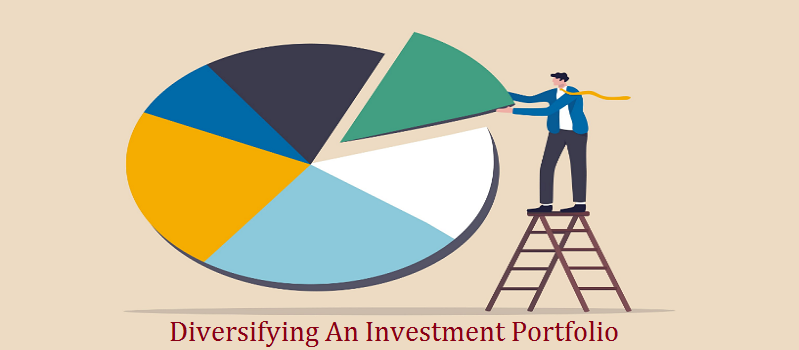Investment is a great way to build wealth. It does not matter whether you are too young or too old to start investing money at all. You might be a babe in the woods or an expert investor, but learning never stops. Diversification of investing assets is what you need to keep exploring. Youngsters often make the mistake of putting all their eggs into one basket. For instance, they invest their entire surplus in stocks. What is vital to build wealth? The answer is simple i.e. to diversify your investments.
It is a risk management strategy that lets you manage your money in various forms of savings and investments so you can reach your financial goals sooner rather than later. Investing the whole of your money in one type of asset will result in a complete loss of money if the market does not perform expectedly.
Things to bear in mind before you start creating your portfolio
First off, you should check if your financial condition allows for it. For instance, if you are on a loan with long-term and bad credit, you should ideally settle it first. If it is a mortgage that lasts for up to 20 years or more, you should ensure that you can pay down the debt smoothly, along with investing money and meeting other recurring expenses.
Check your expenses to know the surplus cash. Under no circumstances should you invest money out of your savings because that is aimed at tiding you over during unforeseen expenses. Do not borrow money to invest money, not even a small loan like a no guarantor loan with bad credit from a direct lender. Borrowing can ruin your financial capacity if you fail to get a return on your investment.
How to protect your investments against the worst scenarios
It is a must to have a diversified investment portfolio. A mix of investments is recommended because they help balance the risks and gains. You can even better survive in the worst scenario. Here is what you should do to protect your investments against the impact of dim market:
1. Know the value of a mix of investments
You must have heard several winning stories of investing in cryptocurrency or flipping condos and becoming rich, but you may find a ton of sad stories. Real estate and the crypto world are subject to massive gains, but they are subject to extreme levels of risk thanks to volatility.
Short-term investments in a single asset attract a lot of new and inexperienced investors as they want to make a lot of money in less time. If you want to exploit long-term gains, you will have to be a bit slow. Spread your investments across several industries, such as real estate, stocks, bonds, housing market and the like.
This will help you minimize your financial risks. Understand this by an example. Suppose you have invested all of your money in the housing market. Now the prices have sharply dropped. If you decide to sell at this time, you will bear huge losses, and if you decide to wait until the market bounces back, your money will remain blocked. You cannot get your money out of it and invest in any other assets too soon.
2. Diversification is over money
Now, you have got to know that you should invest in a variety of assets, as this is the best way to keep risk at bay. However, diversifying your investment portfolio is not just limited to this. You should also invest in yourself. Invest money in your education, personal development and life insurance.
Learning never ends in the investing world, so you should not fight shy of investing money in expanding your knowledge. This is part of personal development. Building wealth does not mean that you do not need to spend money on yourself. Life insurance will secure the future of your family after your death.
3. Give priority to your retirement
Retirement is the first thing you need to focus on while creating wealth for you. You must have found several blogs online talking about how much money you should save for retirement, but this kind of conversation can be distracting. Everyone’s financial circumstances vary, so focus on your own situation and then make a plan.
The planning for retirement should not be compromised in order to seek benefits from other investments. Take advantage of the retirement plan that your employer offers. If not, you can choose a retirement savings account and contribute money consistently. Bear in mind your emergency cushion savings must be different from retirement savings. You cannot dip into the latter.
4. Plan for the unexpected
No matter how careful you are while planning for your investments, you cannot remove the scope of unforeseen events altogether. Therefore, it is a must to prepare for the unexpected. Some events can completely disrupt the economy, but diversifying can keep your portfolio from a huge hit by such uncontrollable events.
When you diversify assets, some of them will naturally suffer from the harmful impact of such events, but you still have a chance to grow your wealth. Making up for any loss is all but impossible if you have thrown your whole money at a single asset. Buying a life insurance policy is also an attempt to ward off the risk of the unexpected.
5. Take expert advice when needed
At the time of diversification of your assets, you will have to weigh the pros and cons. Try to get help from a financial expert if possible. Their guidance will be very fruitful as they can assess your risk tolerance capacity and accordingly suggest a mix of assets you should invest in. They will do it, leaving the scope for creating an emergency corpus and a retirement fund.
The final word
Diversifying an investment portfolio is a must to avert the risk in case of unexpected market scenarios. Take advice from an investment expert, determine your risk-bearing capacity, and invest money in different types of assets to make it successful.









